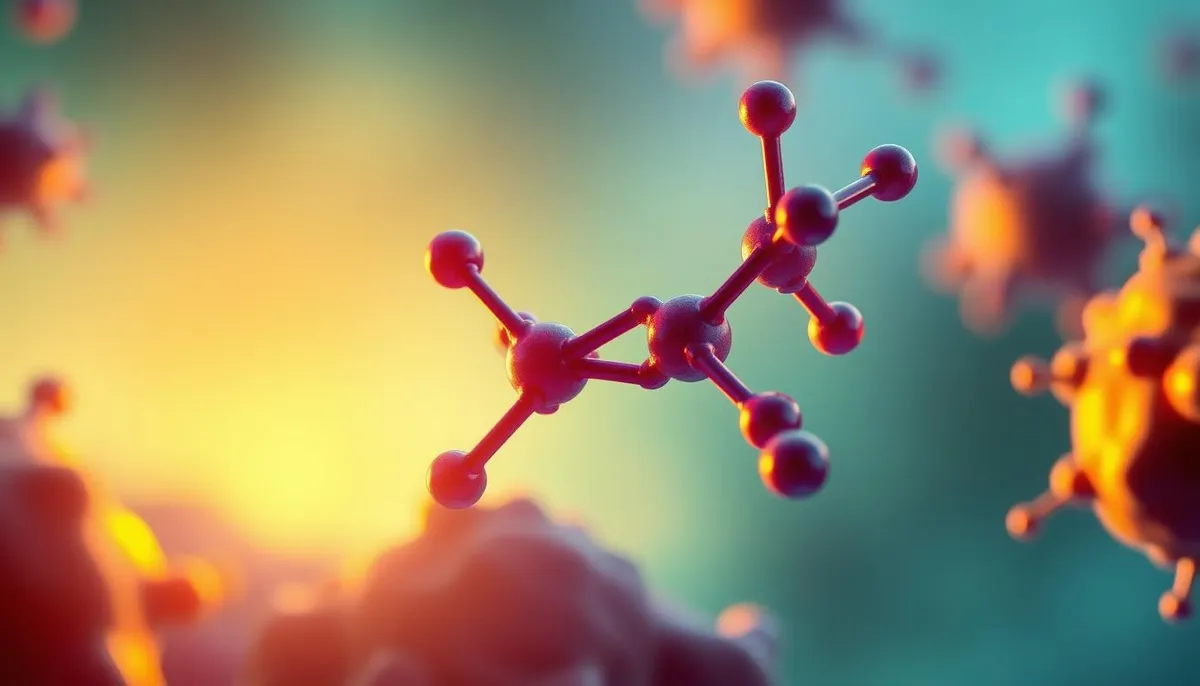Welcome to a journey toward unlocking your full vitality. Many people seek simple, effective ways to support their well-being every day. This guide explores how a key nutrient can play a foundational role in that pursuit.

Biotin, also known as vitamin B7, is a water-soluble vitamin that has gained significant attention in recent years. It’s a crucial player in the body’s energy production processes. Modern health strategies, inspired by innovative approaches to wellness, often highlight its importance for overall vitality.
True health involves a holistic view, combining smart choices with a deeper understanding of how nutrients work. Platforms like longevity-supplement.com connect you to premium options backed by research. This guide will help you navigate the science and practical use of this essential vitamin with confidence.
Key Takeaways
- Biotin, or vitamin B7, is a vital nutrient for supporting overall health and energy.
- Understanding the science behind this vitamin helps you make informed decisions.
- A holistic approach to wellness combines proper nutrition with lifestyle choices.
- This guide provides clear, practical strategies for incorporating biotin into your routine.
- Trusted resources offer access to high-quality supplements based on current research.
- Maximizing your life potential is an ongoing journey that starts with knowledge.
Understanding Dietary Supplement Biotin
This water-soluble nutrient plays a surprisingly complex role in our metabolic processes. To truly appreciate its value, we need to explore its fundamental chemistry and biological functions.
What is Dietary Supplement Biotin?
Known scientifically as vitamin B7, this essential micronutrient appears as a white crystalline solid. Its chemical formula C₁₀H₁₆N₂O₃S represents a heterocyclic compound found in every living cell.
The name itself comes from the Greek word “bíotos,” meaning “life.” This reflects its critical role in sustaining vital biological processes throughout the body.
The Science Behind Biotin and Its Nutritional Role
This vitamin serves as a cofactor for five crucial carboxylase enzymes. These enzymes cannot function properly without its presence, making it indispensable for basic metabolism.
The body uses this coenzyme to break down amino acids, fatty acids, and carbohydrates. It also helps synthesize new fatty acids and glucose, which serve as primary fuel sources.
Since it’s water-soluble, the body excretes excess amounts rather than storing them. This explains why consistent intake through diet or other sources is necessary for maintaining optimal levels.
Understanding these biochemical functions helps you make informed decisions about your nutritional needs. The science reveals why this vitamin supports so many essential processes.
How Biotin Supports Overall Health and Longevity
The connection between proper nutrition and long-term wellness becomes clearer when we examine specific micronutrients. These essential compounds work together to support your body’s fundamental processes.

Key Health Benefits
This vitamin helps convert food into usable energy that powers your entire system. It acts as a co-factor for enzymes that process carbohydrates, fats, and proteins.
Your nervous system relies on adequate levels for optimal function. The vitamin also influences gene expression through a process called biotinylation.
This affects cellular health at the genetic level. Maintaining proper levels supports metabolic efficiency throughout your body.
Longevity Insights from Innovative Health Strategies
Modern approaches to wellness emphasize optimizing every aspect of nutrition. Forward-thinking strategies focus on preventing metabolic issues before they develop.
Ensuring optimal vitamin levels represents a proactive approach to health. This aligns with comprehensive nutrition plans designed for maximum vitality.
These strategies work synergistically with other vitamins and lifestyle choices. Together, they create a foundation for sustained wellness and longevity.
Incorporating Biotin into Your Daily Routine
Adding this essential vitamin to your daily life is simpler than you might think. A balanced approach using whole foods is the best foundation for meeting your needs.
Most individuals get enough through their regular meals. Understanding your specific requirements helps you make smart choices.
Integrating Supplements with a Balanced Diet
Your body needs a consistent supply of this nutrient every day. The recommended intakes vary by age and life stage.
For adults, the Adequate Intake is 30 micrograms. Needs increase slightly during pregnancy and lactation.
Many common items are excellent sources. Including a variety of these in your weekly meals supports optimal levels naturally.
| Food Source | Biotin Content (per 100g) | Practical Serving Idea |
|---|---|---|
| Beef Liver | 31 μg | Enjoy in a weekly stew or pâté. |
| Whole Eggs | 10 μg | A perfect start to your morning. |
| Salmon | 5 μg | Great for a healthy lunch or dinner. |
| Sunflower Seeds | 3 μg | Add to salads or yogurt for a crunch. |
Daily Dosage and Best Practices
A key advantage is its stability. Cooking does not destroy it, so you can prepare meals with confidence.
Whole foods should always be your primary focus. They provide a complex matrix of nutrients that work together.
An extra product may be helpful for some people with specific needs. It is wise to consult a healthcare provider before starting any new regimen.
Focus on building a nutritious eating plan first. This creates a solid foundation for long-term vitality.
Benefits of Biotin for Hair, Skin, and Nails
When it comes to supporting healthy hair and nails, this vitamin often takes center stage. The beauty industry heavily promotes vitamin B7 for its potential cosmetic advantages. Many people hope it can improve their appearance.

True deficiency of this nutrient can indeed cause noticeable problems. Hair loss and brittle nails may occur when levels are severely low. However, such deficiency is extremely rare in the United States.
Boosting Hair Growth and Nail Strength
Scientific studies haven’t proven that extra vitamin B7 improves hair or nail appearance in people with adequate levels. Research shows limited evidence for cosmetic benefits in non-deficient individuals.
When people experience hair thinning or weak nails, other health issues are usually the cause. Iron deficiency, thyroid problems, or hormonal imbalances are more common culprits. These conditions require proper medical diagnosis.
Some individuals report positive changes when taking additional vitamin B7. These personal experiences haven’t been consistently validated through rigorous research. The improvements may involve placebo effects.
Claims about this vitamin effectively treating acne, eczema, or reversing hair loss remain unproven. For people with confirmed deficiency, addressing it can resolve related symptoms. Always consult healthcare providers for proper diagnosis rather than self-treating.
Managing Biotin Deficiency and Potential Side Effects
While most people maintain adequate levels naturally, being aware of deficiency signs can help prevent complications. Understanding both the rare cases of insufficiency and safety considerations ensures responsible use.
Recognizing Early Signs of Deficiency
A true vitamin B7 shortage is uncommon in the general population. When it occurs, early warning signs may include skin rash, particularly red and scaly dermatitis. Hair loss and elevated cholesterol levels can also develop.
Certain conditions increase the risk of deficiency. These include genetic disorders affecting nutrient metabolism and infants with seborrheic dermatitis. People who have undergone stomach removal surgery also face higher risk.
| Risk Factor | Population Affected | Prevention Strategy |
|---|---|---|
| Genetic Disorders | 1 in 40,000-60,000 births | Newborn screening and early treatment |
| Stomach Surgery | Post-gastrectomy patients | Regular monitoring and supplementation |
| Infant Dermatitis | Newborns with skin conditions | Pediatric evaluation and care |
Addressing Interactions and Supplement Safety
For individuals with confirmed deficiency, treatment involves oral dosing under medical supervision. Symptoms often improve rapidly with proper care.
Most people tolerate this nutrient well at recommended levels. Some may experience mild stomach discomfort. The greater concern involves medical test interference.
High doses can disrupt laboratory results for thyroid function and heart health markers. Always inform your healthcare provider about any supplement use before testing. Most professionals recommend stopping intake 48 hours to several weeks prior to medical evaluations.
Seek professional evaluation if you suspect any nutrient imbalance. Self-diagnosis can lead to unnecessary use or missed underlying health problems.
The Role of Biotin in Metabolism and Energy Production
The engine that powers your body’s daily functions relies on a tiny but mighty nutrient cofactor. This essential helper transforms the food you eat into usable vitality through complex metabolic pathways.
How Biotin Facilitates Nutrient Conversion
Vitamin B7 acts as a critical cofactor for enzymes that process macronutrients. Without adequate levels, these enzymes cannot properly break down carbohydrates, proteins, and fatty acids.
The body depends on this vitamin for converting food into cellular fuel. It enables the extraction of energy from all three major nutrient groups.
| Key Enzyme | Metabolic Function | Nutrients Processed |
|---|---|---|
| Pyruvate Carboxylase | Gluconeogenesis | Carbohydrates |
| Methylcrotonyl-CoA Carboxylase | Amino Acid Metabolism | Protein, Leucine |
| Propionyl-CoA Carboxylase | Fatty Acid & Cholesterol Breakdown | Fatty Acids, Amino Acids |
These enzymatic processes demonstrate how biotin supports energy production. It doesn’t provide energy directly but enables your system to utilize nutrients efficiently.
The vitamin works synergistically with other nutrients found in whole foods. Complete nutrition ensures all metabolic pathways function optimally for sustained vitality.
Expert Health Strategies Inspired by Blueprint Bryan Johnson
Blueprint Bryan Johnson’s health optimization strategy represents a revolutionary shift in how we approach wellness. This comprehensive framework combines cutting-edge science with premium nutrition options for maximum longevity impact.
Premium Supplement Options and Health Insights
In the United States, standard multivitamins typically provide 30 mcg of this vitamin per day. This meets 100% of recommended intakes for adults. Specialized formulations may contain dramatically higher doses for specific health support.
The US National Academy of Medicine has not established an upper limit for this nutrient. Research continues to explore high-dose applications for neurological conditions. Always consult healthcare professionals before starting any new regimen.
Integrating Lifestyle Changes for Longevity
Taking this vitamin represents just one component of a comprehensive health strategy. Protein-rich foods like liver provide natural sources alongside other essential vitamins and minerals.
True wellness involves multiple factors working together. Proper nutrition, regular exercise, and stress management create a foundation for lasting vitality. These elements support your body’s natural processes for optimal function.
Platforms like longevity-supplement.com connect you with premium options aligned with evidence-based strategies. This approach helps you build a personalized plan for maximizing your life potential.
Conclusion
Achieving lasting vitality requires a thoughtful approach to nutrition and lifestyle choices. This essential B vitamin plays a crucial role in converting food into energy that powers your body each day.
While deficiency is rare, maintaining proper levels supports metabolism and overall health. Most adults can meet their needs through a balanced diet rich in various foods.
When considering additional products, consult healthcare professionals for personalized guidance. High doses may affect medical test results, so always inform your provider.
Optimal wellness involves more than isolated nutrients. It requires comprehensive strategies working together for sustained vitality.
Ready to maximize your life potential? Sign up now at longevity-supplement.com to begin your journey toward a healthier future.
FAQ
What exactly is biotin and what does it do in the body?
Biotin, often called vitamin B7, is a water-soluble nutrient. It acts as a helper in your system, aiding enzymes that break down fats, carbohydrates, and proteins from the food you eat into usable energy. This process is vital for maintaining healthy hair, skin, and nails.
Can taking biotin really improve my hair and nail health?
Many people report stronger nails and healthier-looking hair when they add this vitamin to their routine. While research is ongoing, it plays a key role in the production of keratin, the protein that is the main building block of your hair and nails. A deficiency can lead to problems, so adequate intake is important for their strength and growth.
What are the common signs that I might not be getting enough biotin?
Early signs can be subtle. You might notice thinning hair, a red scaly rash around the eyes, nose, and mouth, or brittle nails. Chronic fatigue and nervous system issues can also occur. However, true deficiency is rare because it’s found in many common foods and is also produced by gut bacteria.
Are there any side effects or risks associated with biotin supplements?
For most individuals, these products are considered safe when taken as directed. Because it is water-soluble, any excess is typically flushed out in urine. It’s always a good idea to talk with your healthcare provider before starting any new regimen, especially if you are pregnant, nursing, or have underlying health conditions.
How much should I take each day, and what are the best food sources?
The adequate intake for most adults is 30 micrograms per day. You can find it naturally in a variety of foods like eggs (especially the yolk), nuts, seeds, salmon, avocados, and sweet potatoes. Integrating these into a balanced diet is a great way to support your levels.
How does this vitamin help with energy and metabolism?
It’s a crucial player in your metabolic engine. It helps convert the nutrients from your meals—fats, amino acids, and carbohydrates—into fuel your body can use. This supports overall energy production and helps keep your metabolism running smoothly.
RelatedRelated articles



